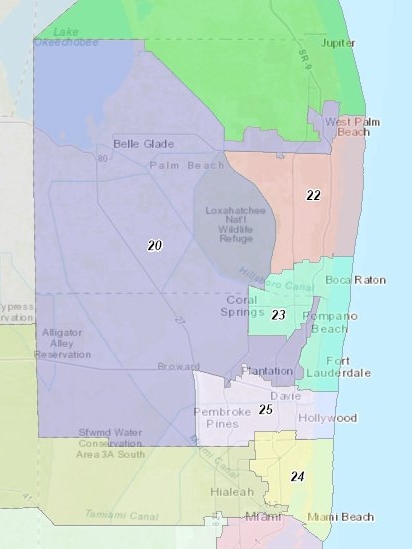UPDATE: In a bold move that has just been announced, Florida Governor Ron DeSantis is pushing for a mid-decade redistricting of congressional district lines, a strategy that could reshape the political landscape ahead of the 2026 Midterm Elections. This initiative, which comes just a few years before the next mandated redistricting in 2030, is igniting fierce debate and resistance across the state.
This redistricting effort follows similar actions in other states like Texas and Missouri, and could potentially tilt the balance of power in Washington, D.C. The implications are significant: it could alienate voters, alter political careers, and reinforce Republican dominance in Congress, where they currently hold a 20 to 8 advantage over Democrats among Florida’s 28 congressional districts.
In a state with a growing population of registered voters, DeSantis claims this redistricting is necessary to reflect a surge in Republican voter registration, with at least 1.4 million more GOP voters than Democrats. However, critics argue this move is a blatant power grab aimed at solidifying Republican control as the party seeks to maximize its influence in the upcoming elections.
The political maneuvering is not without controversy. Common Cause recently commissioned a poll revealing that 62% of Democrats and 60% of No Party Affiliation (NPA) voters oppose mid-decade redistricting. Even among Republicans, opposition stands at 45% to 36%. This widespread discontent highlights the potential backlash DeSantis may face as he pursues this initiative.
Florida’s redistricting history is fraught with political tension and allegations of manipulation. The last redistricting process saw a court ruling favoring DeSantis after he challenged a map designed to maximize Black voting strength. Critics argue that the new proposed lines could disproportionately affect voters in South Florida, where five of the eight Democratic representatives reside.
As DeSantis approaches the end of his gubernatorial term next year, he is also expected to push through other contentious legislation, including significant property tax cuts and changes to childhood vaccine mandates. These developments are shaping up to create a politically charged atmosphere in Florida, with just 60 days of legislative session to navigate these critical issues.
With mounting public opposition and the potential for significant electoral ramifications, all eyes will be on Florida as this redistricting plan unfolds. The decision to redraw district lines now raises fundamental questions about fairness and representation, setting the stage for a contentious political battle in the near future.
Stay tuned for updates as this urgent situation develops in Florida’s political landscape.





































































